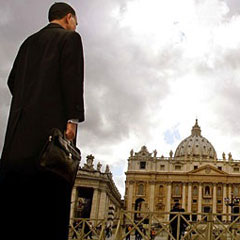In this past Sunday’s parish bulletin, the parish priest posted a few reflections and updates on parish life in Hamilton.
The lead item was on presbytery life. Some of what Fr Paddy wrote was tongue in cheek, but his underlying point is serious:
“How good and pleasant it is when brothers (and sisters) dwell in unity!” — Ps 133:1.
We are truly blessed to share a rich common life in the Parish House with the inclusion of Fr John Corrigan, and the return of Fr John McKinnon from his six months in Portland. The youthful energy of John ‘the younger’ and his bright and generous personality has already enriched the parish immensely. We delight to have back with us the wisdom of ‘the elder’ John. The feminine presence is well represented by Sr Marg, who quickly picks up on any trace of ‘male chauvinism!’
Our meal times are a special blessing with each taking their turn at cooking. Our debriefing on the day and conversation on current and church news, is spirited and enriching.
With three generations represented, it has been remarked that we represent granddad, mum and dad, and son! Not so! The relationship is equal, adult, and fraternal.
The thing that struck me most, when I first arrived at Hamilton, was the presbytery meal schedule. It is more typical of an era I thought had long gone. Breakfast is an individual affair, but lunch and dinner are not.
Lunch is our main meal, and the secretary and business manager and whoever else is around — we often have dinner guests — join us. The phone is diverted to voice mail for 45 minutes, so after the main course we’re free to linger over fruit and cheese and coffee.
Tea is a more modest meal, but it is an opportunity for me to perfect my pasta. (My risotto is best forgotten!) The four of us in residence eat in common, and again, the meal will last for about an hour.
When I commented on this in the first week or so, Fr Paddy made a very good point. He said we could hardly encourage the families in the parish to switch off the TV and sit around the table, if we weren’t even doing it ourselves. It’s a good opportunity to practise what we preach.
But apart from that, the meal schedule is good in itself. It makes for a happy and supportive work environment. It ensures a healthy diet. The opportunity to ‘debrief’ benefits our pastoral work. But what is most critical, I think, is that it fosters family life.
This past fortnight particularly, I’ve been astonished at how many times I’ve heard or read the claim that clerical celibacy is impossible. Not: ‘it discourages priestly vocations,’ or ‘many are called but few are chosen.’ No. The meme of the moment is that celibacy simply can’t be lived. Everyone falls sooner or later. Celibacy is impossible.
The basis of the argument is, I think, that the sexual appetite is too strong. It cannot be suppressed. It must be gratified. But if the sexual appetite is such that celibacy is impossible, then surely it follows that any form of chastity is unsustainable?
Let me be clear. None of the people who presented this argument to me suggested that chastity is impossible. The parameters of discussion didn’t go in that direction. But I think that’s the conclusion that follows, implicitly but logically. It’s not a wild leap, I think, between discounting celibacy and discounting monogamy.
Call me a naïve, but I think both are possible. And they don’t need to be spiritualised. They can be achieved through prudent decisions and an ordered lifestyle.
I do think chastity is possible. But I don’t think it is good for man to be alone. It is family life — with its own form of intimacy — which is the key not only to a happy marriage, but also I think, a happy celibacy.
If (or more likely, when) I fall in love, I’d like to think my prayer life will sustain me. But I’d be a fool to rely on it. Grace builds on nature. Which is why I’m grateful for the family life — or if you prefer, community life — of the Hamilton presbytery.
The support a celibate needs takes many different forms, but this is one of them. And it’s one I like. This sort of family life is something I hope to replicate wherever I live. Then, please God, my own experience will vindicate the possibility of a happy and faithful celibacy.






No, celibacy is not impossible, but without the charism, it’s distressingly burdensome. Those who were unjustly forced to carry this cross without the corresponding grace, can look forward to a reward in heaven exceeding those who happily embraced compulsory celibacy, having been given the charism.
The fact of such a special reward of course does not justifiy the existence of the “law”. It should be repealed.
And ultimately, it’s not so much about unsatisfied sexual drives as the absence of that special love that only exists between a husband and a wife. (And NO, Our Lady is NOT a substitute for a wife’s loave in the heart of the priest crushed by the law because he lacks the charism – neither is God Himself, who said “it is not good for man to be alone.”
Wolsey, I appreciate that you don’t argue that celibacy is impossible, and I agree absolutely that devotion to our Lady is no substitute for spousal love. But aren’t you yourself unnecessarily spiritualising things, when you insist that without a special grace celibacy is “distressingly burdensome?”
Well, yes, that’s why so many – not all, but so many – celibate priests suffer from various emotional problems. Some are just neurotic, others hit the bottle (big in Anglophone countries). Yet others simply ignore the law (Latin countries – excepting France, and Latin America). Others have girlfriends (Fr Kevin Lee) and may not fall at first, but eventually do. I even know one – a seminary professor – who ran off with a married woman. Still others sublimate their need for a missing wife by means of careerism and ambition.
The problem is, even in a traditionalist clerical community, while there were a lot of well-adjusted individuals, there were a significant number who were obviously labouring under emotional/psychological distress, which I could only put down to a common cause – compulsory celibacy. The “law” does not have that secondary infallibility behind it which enlivens universal ecclesiastical law, any more than did the decree which unjustly suppressed the Jesuits. It’s time to admit that a mistake has been made, and remedy it. To force those clerics who don’t have the gift (the majority of Latin-rite clerics), as if they did offends the principle that grace builds on nature. God doesn’t ordinarily work by hammering round pegs into square holes.
Our Lord said that only those “to whom it has been GIVEN can do this” … Matt IXX:11.
Here is the relevant canon from Trent:
CANON IX.-If any one saith, that clerics constituted in sacred orders, or Regulars, who have solemnly professed chastity, are able to contract marriage, and that being contracted it is valid, notwithstanding the ecclesiastical law, or vow; and that the contrary is nothing else than to condemn marriage; and, that all who do not feel that they have the gift of chastity, even though they have made a vow thereof, may contract marriage; LET HIM BE ANATHEMA: seeing that God refuses not that gift to those who ask for it rightly, neither does He suffer us to be tempted above that which we are able.
Look where the anathema is. This means that the Holy Ghost only guarantees the veracity of that content that precedes it. This means, in turn, that the bit outside of the anathema (“seeing that God refuses not the gift …) was rejected by the Holy Ghost. Hence one arrives at the proposition that celibacy requires a charism that is given, like a vocation (“you have not chosen me, but I have chosen you”) anteriorly to any request to God for possession of such a charism, and furthermore, it is pointless to request that God bestow that charism in its absence.
Hence the tension between those clerics lacking the charism, and the demand of the law that they live as if they possessed it.
Most people are celibate most of the time. Young people, old people, divorced people, disabled people, married people who have ‘gone off’ each other, even for a while, or exhausted by the baby crying, or work. Single people.
Sex is highly over-rated. If you are not married, you can easily do without it, because sex is ordered with a loved one. If you can’t do without it, you’re suffering from lust.
The abuse of sex is responsible for the demise of our society. To say priests should marry is absurd … they don’t have the time for a wife and children and would not get the support they normally do in the parish if Father had an ‘Er Indoors over in the presbytery.
Mumu, I agree with you. Sex is not the beginning and the end of everything. Love is – Hence, God has commanded us to ‘Love the Lord, Thy God with thy whole heart, thy whole soul and with all your might and to love your neighbour as thyself. If all of us concentrate on ‘God is Love’ and we use all our energies in loving God and loving each other with the love of God as we love ourselves, this world will be transformed into Heaven.
Mu Mu,
Don’t be ridiculous. You also seem to think you know better than God, who specifically provided for clerical marriage, foreseeing all the circumstances of the priestly (and episcopal) apostolate.
If priests “don’t have time for a wife”, neither do police, army officers, accountants, judges, barristers, solicitors, doctors, tradesmen running their own businesses – what a silly position to take!
Oooooh! Getting a bit hot under your collar there, Wolsey! Anyone would think I was proposing clerical celibacy instead of endorsing it…
It’s not so much that I’m getting hot under the collar, as that you’re writing nonsense – and, I think, knowingly. Otherwise how could you, an adult, seriously propose such an irrational argument??
No, Mu Mu,
The abuse of sex is not responsible for the demise of our society – the protestant “reformation” in the 16c is. The abuse of sex is just one of the effects of the privatisation of the notion of “conscience” effected by Luther.
Privatisation of conscience started in Eden; the reformation might never have happened if not for monasteries fattening themselves at the expense of peasants and the rejection of Humanae Vitae by theologians and bishops (they are still silent on the subject) gave the sexual revolution its impetus.
Eve is running amok and the bishops are too frightened to stop her; this is the tragic situation we have now.
Sorry, Mu Mu, you’re going to have to do better than rely on protestant/counter-reformation metanarrative concerning 16c church history.
If the monasteries were “fattening themselves at the expense of peasants”, why did so many of those peasants take part in the Pilgrmiage of Grace, – an armed uprising – demanding the restoration of those very abbeys and priories?
No, privatisation of conscience began with Luther. It was a new and revolutionary concept.
Hello Fr John. May I ask if you have had banana or pineapple fritta lately?
How is your coffee machine going? When I come to Royal Hamilton can you please make me a hot chocolocate? The best hot chocolate is at the Westpac Centre Cafe where Collingwood trains there good potatoes wedges there too and is Collingwood super store there too. The Big Black Coffee Truck in Warrnambool makes good hot chocolate too.
Casterton Cup on Sunday. Watch the steeple on TVN or on Sky channel. Let me know what you think.
Keep well from Simon the Pieman.
A few years ago I was a housekeeper for a couple of priests. The PP would invite half a dozen of his clerical mates round for lunch and I’d cook for them. After I’d served dessert and coffee I’d close the door and stand outside, listening to their laughter. It was – and still is – the most beautiful sound I’d ever heard, Bach’s St John Passion not excepted.
The PP used to say that a priest must fraternise with his fellow priests on his day off, prferably playing golf. If he didn’t, said Father, he’d go off the rails.
Dear Wolsey, I agree with you about Mu Mu’s position on celibacy, which at best I could only describe as pious idealism.
However I think you are engaging in some counter-reformational meta-narrative of your own, surely! And what is it with this “privatisation of conscience” phraseology? Do you mean freeing it from regulation, or merely freeing it from some kind of collective ownership? Clearly, the concept of conscience requires some benchmark, but it is not at all clear that this must be wholly external, such as is implied by insisting that good conscience is that – and that only – which is formed in accordance with Church teaching. Conscience is nothing if it is not in some sense “privatised” or individual.
And I am not at all sure the sort of view that would see Luther as corrupting the concept of conscience can be upheld. In one of his Wittenburg sermons, circa 1524, to the community at Strassburg, he spoke of “good conscience in the Holy Spirit…if you rightly believe and have Christ so that he truly loves and reigns in you”. He goes on to say that “dissensions, sects and errors” among Christians “deprive consciences of…a comforting knowledge, lead to error and unconsciously turn the spirit from inward grace toward external things and works.” (E.G.Rupp, Benjamin Drewery, Martin Luther, 1970, p. 114).
This doesn’t sound like he was doing a demolition job on conscience, unless you assume the kind of position I alluded to above, and, as I said, that is a particular counter-reformational narrative operating. Some people criticise their opponents’ theological conclusions as evidence of “cherry-picking” or of “theology for profit” – in other words, “privatisation”.
However, it all depends on the root assumptions and emphasis, surely, and, in that sense, everyone does exactly the same. You only have to consider the not-so edifying spectacle of diverse groups all insisting on their conception of the Church or true Catholic teaching.
Pious Idealism?
Only a sentimentalist would imagine that a priest and his wife could escape the eruptions decimating marriages in our eroticised culture.
To say the Church has made a mistake in her discipline of clerical celibacy is arrogance. It is certainly not good that most priests live alone in their presbyteries, so parishioners who invite Father to their homes for a meal are performing an act of charity.
I’m the great granddaughter of a priest
An Anglican priest.
Before everyone retreats behind the barricades and throws more snide comments at Mu Mu (though the ones about the Protestant Reformation are equally disturbing) I’d just like to say there is so much practical sense in what Mu Mu is saying.It is very difficult (though I would say not impossible) to sustain a healthy family life as well as a fully committed priestly life.This is something that is rarely if ever considered in discussions of priestly celibacy.The comparisons to various professions simply don’t hold.
In my great grandfather’s case his wife died quite young after bearing three children, one disabled, and (very unusually for late 19th century England) he did not remarry.QED.
It’s sad when practical commonsense is labelled sentimentality.
I lived with four parish priests over a period of time. Two were alcoholics. Drunk almost every night of the week. One was a drunk. The other had major sexual hangups. They were all parish priests. One died overseas in a hotel. Tragic. But they were all very lonely men all the time. None could relate at all. They sank into their bottles and were tragic figures trapped into celibacy and resigned to never know or feel love. All scared of any emotion.
Live in a presbytery like that and it destroys you. They were lost men and no bishop helped them. When help was sought from one bishop he ignored the plea. So much for care of priests. Is it any wonder priests fall in love. In the Philippines how many priests have women lovers? In Africa and s america? One bishop in the latter had to go recently due to that.
Still a co ver up and swept under carpet.
Tragic and sad and not right.
Need to be communities of priests living together for support.